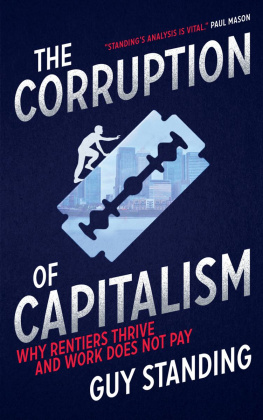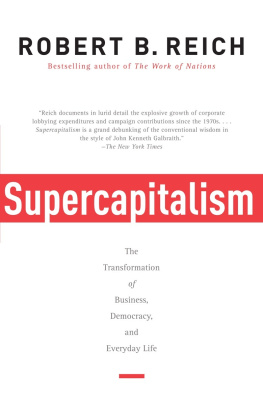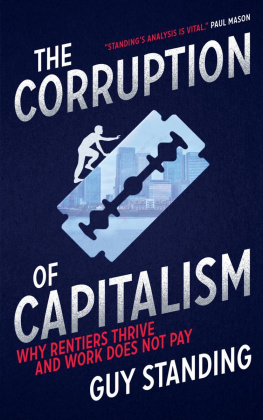Standing - The corruption of capitalism: why rentiers thrive and work does not pay
Here you can read online Standing - The corruption of capitalism: why rentiers thrive and work does not pay full text of the book (entire story) in english for free. Download pdf and epub, get meaning, cover and reviews about this ebook. City: London [England], year: 2016, publisher: Biteback Publishing, genre: Politics. Description of the work, (preface) as well as reviews are available. Best literature library LitArk.com created for fans of good reading and offers a wide selection of genres:
Romance novel
Science fiction
Adventure
Detective
Science
History
Home and family
Prose
Art
Politics
Computer
Non-fiction
Religion
Business
Children
Humor
Choose a favorite category and find really read worthwhile books. Enjoy immersion in the world of imagination, feel the emotions of the characters or learn something new for yourself, make an fascinating discovery.
The corruption of capitalism: why rentiers thrive and work does not pay: summary, description and annotation
We offer to read an annotation, description, summary or preface (depends on what the author of the book "The corruption of capitalism: why rentiers thrive and work does not pay" wrote himself). If you haven't found the necessary information about the book — write in the comments, we will try to find it.
Standing: author's other books
Who wrote The corruption of capitalism: why rentiers thrive and work does not pay? Find out the surname, the name of the author of the book and a list of all author's works by series.
The corruption of capitalism: why rentiers thrive and work does not pay — read online for free the complete book (whole text) full work
Below is the text of the book, divided by pages. System saving the place of the last page read, allows you to conveniently read the book "The corruption of capitalism: why rentiers thrive and work does not pay" online for free, without having to search again every time where you left off. Put a bookmark, and you can go to the page where you finished reading at any time.
Font size:
Interval:
Bookmark:
| CETA | Comprehensive Economic and Trade Agreement |
| ECB | European Central Bank |
| EU | European Union |
| GDP | Gross Domestic Product |
| G20 | Group of nineteen major economies and the European Union |
| ILO | International Labour Organization |
| IMF | International Monetary Fund |
| ISDS | InvestorState Dispute Settlement |
| MGI | McKinsey Global Institute |
| MPS | Mont Pelerin Society |
| NHS | National Health Service (UK) |
| OECD | Organisation for Economic Cooperation and Development (thirty-four mainly industrialised member countries) |
| ONS | Office for National Statistics (UK) |
| PAC | Parliamentary Accounts Committee (UK) |
| PFI | Private Finance Initiative (UK) |
| QE | Quantitative Easing |
| TPP | Trans-Pacific Partnership |
| TTIP | Transatlantic Trade and Investment Partnership |
| TUC | Trades Union Congress (UK) |
| UK | United Kingdom |
| UN | United Nations |
| USA | United States of America |
| WIPO | World Intellectual Property Organization |
| WTO | World Trade Organization |
T his book is about something worse than corruption by individuals or companies. It is about the uncharted corruption of a claimed ideal free markets and how economies are being rigged to favour owners of assets the rentiers while depressing incomes from labour.
Some would say that capitalism is inherently corrupt, because those who can cheat successfully for long enough do very nicely and always have. Even many of those who espouse capitalism unreservedly would grudgingly admit to that. Every day there is a report of some economic crime. There are too many rogues whose names are known to us to imagine that corruption does not pay. There is a saying among Russian businessmen: never ask how he got his first million.
Yet that is not what this book is about. It is about how the claims made on behalf of capitalism have been subverted in the construction of a system that is radically different from what its advocates claim. They assert a belief in free markets and want us to believe that economic policies are extending them. That is untrue. Today we have the most unfree market system ever created. It is deeply corrupt because its leaders claim it is the opposite of what it is becoming.
How can politicians look into TV cameras and say we have a free market system when patents guarantee monopoly incomes for twenty years, preventing anyone from competing? How can they claim there are free markets when copyright rules give a guaranteed income for seventy years after a persons death? How can they claim free markets exist when one person or company is given a subsidy and not others, or when they sell off the commons that belong to all of us, at a discount, to a favoured individual or company, or when Uber, TaskRabbit and their ilk act as unregulated labour brokers, profiting from the labour of others?
Far from trying to stop these negations of free markets, governments are creating rules that allow and encourage them. That is what this book is about.
There he was, speaking to the 2015 Financial Times Business of Luxury Summit in the principality of Monaco, in the company of glamorous wealth. With a personal fortune of upwards of $5.5 billion built on a tobacco inheritance and augmented by luxury brands such as Cartier, Chlo and Vacheron Constantin South African Johann Rupert revealed he had been having nightmares. He could not sleep, he said, because he saw inequality generating envy, hatred and social warfare. He was worried stiff by the prospect of revolt. Addressing his well-heeled audience, he concluded, Its unfair. So thats what keeps me awake at night.
One feels Johanns pain.
On the other side of the Atlantic, in Seattle, venture capitalist and fellow plutocrat Nick Hanauer, another who drew his first fat cheques from a dynastic family business, albeit one making feather bedding rather than cigarettes, was worrying about pitchforks aimed in his direction and his fellow 0.01ers. In his dreams, he feared the sans-culottes of the French Revolution, who sent the aristocrats to the guillotine. To avert the threat, he advocated a higher minimum wage, a desirable move but hardly one that would threaten the structures producing the malaise of inequality and insecurity. But at least he recognised that revolt was justified.
Revolt takes many forms. Sometimes it stems from desperation; there is nothing to lose. Sometimes it stems from a dying moment, when the tide of history is drowning the losers, when just standing up is an act of defiance. The miners strike in Britain in 1984 was like that. It was resistance against loss of a way of labouring that had turned adversity into a community of shared identity. Similarly, the Luddites of the early nineteenth century were resisting disruption to a way of life that weavers had forged over generations as a means of dignifying their community.
Sometimes, though, revolt is more strategic, directed to an end largely understood by those taking part, or by enough of those leading it to give it coherence and sustainable strength. These are the revolts of those wanting to accelerate change and steer it in new directions.
The anger of injustice is combined with a belief that something better can be achieved. In such times throughout history, a collective energy comes from the shared anxieties of people who feel common pressures and a common resentment towards those taking the pickings of society while they are left behind, losing rights they had come to expect. In such circumstances, revolt is against the minority who are gaining from social structures that are anything but natural.
The theme of this book is that conditions have been created in which some sort of revolt is increasingly likely. It will conclude by considering what that might look like and who might be its leaders. Before doing so, the nature of the problem and the scale of the challenge must be understood. Chapter 1 begins by laying out the global context, recalling the decay of institutions and social policies that had served the post-1945 era reasonably well and how they were dismantled. It was no golden age; it was merely better in many respects than what had preceded it.
Chapter 2 considers the institutional architecture that has been carefully constructed to orchestrate the development of a global market system in which rentiers those living off income gained from property and other assets are thriving at the expense of most people in most societies. International bureaucracies in Geneva, Washington DC, London and elsewhere have shaped the rules that have made the system so unfree and the gains by the plutocracy and elite so vast.
Chapter 3 deals with one of the dirty secrets of the age: the stealthily built edifice of subsidies that in diverse ways flow to the plutocracy, the elite, their corporate equivalents and other rentiers. Those below them pay the price in higher taxes, lower benefits and worse public services. The rentiers have shunted much of their wealth into tax havens, as the Panama Papers leaked in spring 2016 so comprehensively revealed. No fewer than seventy-two former or current heads of state or government princes, sheikhs, Presidents and Prime Ministers were exposed, as well as a wide array of the worlds wealthiest. Those tax havens did not come about and persist for many years by accident; they were and remain a means of subsidising the rich, a hand-out they neither earn nor deserve.
Font size:
Interval:
Bookmark:
Similar books «The corruption of capitalism: why rentiers thrive and work does not pay»
Look at similar books to The corruption of capitalism: why rentiers thrive and work does not pay. We have selected literature similar in name and meaning in the hope of providing readers with more options to find new, interesting, not yet read works.
Discussion, reviews of the book The corruption of capitalism: why rentiers thrive and work does not pay and just readers' own opinions. Leave your comments, write what you think about the work, its meaning or the main characters. Specify what exactly you liked and what you didn't like, and why you think so.












